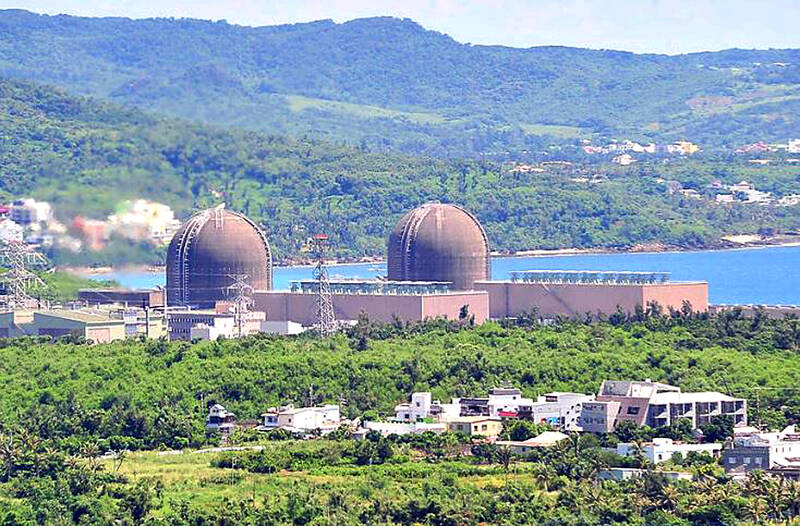The Democratic Progressive Party (DPP) yesterday said that its stance on a “nuclear-free homeland” remains unchanged.
Vice President William Lai (賴清德), the DPP’s candidate for next year’s presidential election, at a forum on Sunday said that government agencies were studying the feasibility of maintaining closed nuclear reactors so they could be restarted in case of an emergency.
This led to speculation that President Tsai Ing-wen’s (蔡英文) promise of a nuclear-free Taiwan by 2025 might not be fulfilled.

Photo: Tsai Tsung-hsien, Taipei Times
Chen Shih-kai (陳世凱), spokesperson for Lai’s election campaign, yesterday said that Lai’s remarks were in response to a student’s question: If Taiwan got into an extreme situation such as a war or a blockade, how can the energy gap be filled?
Lai’s answer was based on a hypothetical situation in which national security is at risk due to “extreme” external conditions, Chen said.
Taiwan should boost its energy self-sufficiency, Lai said, adding that it should develop plans to respond to emergencies and extreme situations.
Decisions made during unusual and extreme situations require social consensus, he said.
Lai did not mention or support extending the use of the Jinshan Nuclear Power Plant in New Taipei City’s Shihmen District (石門) or the Guosheng Nuclear Power Plant in New Taipei City’s Wanli District (萬里), the reactors of which have been shut down, Chen said.
DPP spokesman Chang Chih-hao (張志豪) yesterday said that the party’s promise of a “nuclear-free homeland” remains unchanged and the government would continue to develop and increase the ratio of energy from renewable sources.
Lai repeatedly emphasized the importance of renewable energy development and energy self-sufficiency at the forum, Chang said.
It is the DPP’s priority to expand self-sufficient renewable energy and energy storage equipment, to save electricity and reduce consumption, he said.
Premier Chen Chien-jen (陳建仁) has said many times that the goal of a “nuclear-free homeland” is a consensus in Taiwan, Cabinet spokesman Alan Lin (林子倫) said yesterday, adding that it has always been the government’s goal.
New Taipei City Mayor Hou You-yi (侯友宜), the Chinese Nationalist Party (KMT) candidate for the presidential election, yesterday said that if elected, he would ensure nuclear safety and manage nuclear waste.
Nuclear power is one option among the nation’s diverse energy sources that he supports, Hou said, making his first statement on nuclear power as a presidential candidate.
He said he would ensure that energy sources are in line with global trends, and that there would be no shortage of electricity.
Asked about the DPP’s goal of creating a nuclear-free Taiwan by 2025, he said that “it can’t be done, really can’t be done.”
Meanwhile, regarding the Supreme Court’s ruling to uphold the life imprisonment of a man who was initially sentenced to death for setting fire to his rented residence, killing nine people, Hou said that the death penalty is fair, just and in line with public expectations.
“I’m against abolishing the death penalty,” he added.
Additional reporting by Lai Hsiao-tung and Chung Li-hua

The brilliant blue waters, thick foliage and bucolic atmosphere on this seemingly idyllic archipelago deep in the Pacific Ocean belie the key role it now plays in a titanic geopolitical struggle. Palau is again on the front line as China, and the US and its allies prepare their forces in an intensifying contest for control over the Asia-Pacific region. The democratic nation of just 17,000 people hosts US-controlled airstrips and soon-to-be-completed radar installations that the US military describes as “critical” to monitoring vast swathes of water and airspace. It is also a key piece of the second island chain, a string of

A magnitude 5.9 earthquake that struck about 33km off the coast of Hualien City was the "main shock" in a series of quakes in the area, with aftershocks expected over the next three days, the Central Weather Administration (CWA) said yesterday. Prior to the magnitude 5.9 quake shaking most of Taiwan at 6:53pm yesterday, six other earthquakes stronger than a magnitude of 4, starting with a magnitude 5.5 quake at 6:09pm, occurred in the area. CWA Seismological Center Director Wu Chien-fu (吳健富) confirmed that the quakes were all part of the same series and that the magnitude 5.5 temblor was

Taiwan will now have four additional national holidays after the Legislative Yuan passed an amendment today, which also made Labor Day a national holiday for all sectors. The Chinese Nationalist Party (KMT) and Taiwan People’s Party (TPP) used their majority in the Legislative Yuan to pass the amendment to the Act on Implementing Memorial Days and State Holidays (紀念日及節日實施辦法), which the parties jointly proposed, in its third and final reading today. The legislature passed the bill to amend the act, which is currently enforced administratively, raising it to the legal level. The new legislation recognizes Confucius’ birthday on Sept. 28, the

The Central Weather Administration has issued a heat alert for southeastern Taiwan, warning of temperatures as high as 36°C today, while alerting some coastal areas of strong winds later in the day. Kaohsiung’s Neimen District (內門) and Pingtung County’s Neipu Township (內埔) are under an orange heat alert, which warns of temperatures as high as 36°C for three consecutive days, the CWA said, citing southwest winds. The heat would also extend to Tainan’s Nansi (楠西) and Yujing (玉井) districts, as well as Pingtung’s Gaoshu (高樹), Yanpu (鹽埔) and Majia (瑪家) townships, it said, forecasting highs of up to 36°C in those areas